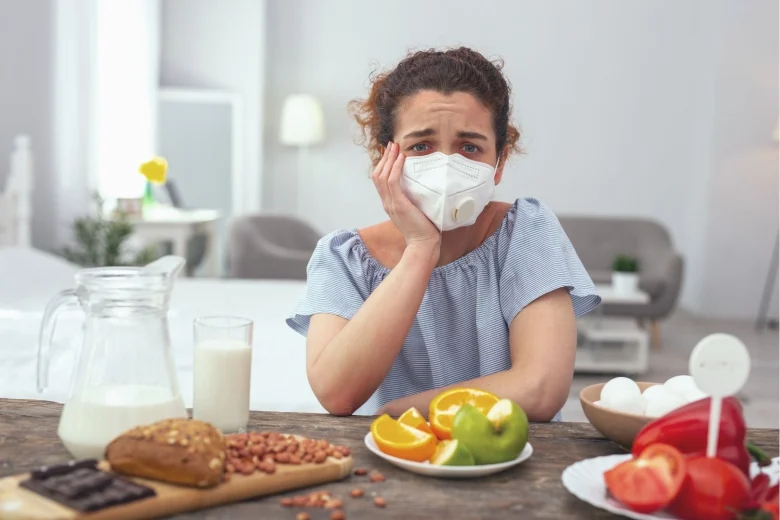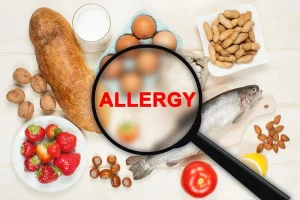Food allergies can spoil the most enjoyable occasion and flip it all in seconds into a nightmare. Food love is however restricted in how far one can go, as it can turn into a health complication quickly. Goode notes that, however, as food allergies become more prevalent, the skills to understand them and know what to do in case of such reactions should be possessed by all and sundry, especially those who are the major targets.
After attending a celebratory dinner or working luncheons with friends, the discomfort begins to settle in slowly. Accurate facts were needed to prevent a transition from a state of panic to embarrassment. This handbook will help you with everything, from recognizing food allergies to coping strategies and first-aid actions that can be needed. So let’s begin and do this for our good as well as in all situations that we shall find ourselves feeling pretty capable of!
What Are Food Allergies?
‘’Food protein allergy’’ also known as a food allergy pertains to an aberrant overreaction by the immune system towards particular food proteins. This immune reaction leads to diverse symptoms, which may be mild or severe. The most frequent ones include peanuts, tree nuts, dairy, eggs, soy, wheat, fish, and sometimes shellfish. In the case of an allergy, if the patient eats any of these foods, the body will generate ‘histamine’ and other chemicals because the body considers it a pathogenic factor.
This can result in causing inflammation as well as other signs and symptoms in the person in several systems of the body. Some may only experience minor discomforts such as hives and stomachaches, and others may find themselves in a critical outlook and reinforced to seek some medical help. Hence this understanding is the core for everyone who comes into contact with risky categories of people. Awareness nurtures understanding and makes reasonable dining habits for all the people concerned.
Common Symptoms Seen in Food Allergie Reactions:
Quite a wide range of symptoms and reactions are reported in response to food allergy and hence all symptoms should be identified as early as possible.
People will also tend to complain of the skin, which is tormented with itching, bumps or even swelling. For instance, this may occur almost immediately, although it is not anticipated after the person is exposed to an allergen.
Other problems include that of digestion. Patients can suffer nausea, vomiting, or diarrhoea very soon after taking food contents to which they are allergic.
The systemic signs should be emphasised as well. Nausea, nasal obstruction, and post-nasal drip might be an alarming response to some foods, resulting in significant food allergies.
Sometimes patients might also give some of the vital signs, such as temperature, pulse, or blood pressure; perhaps it is even heart rate and blood pressure changes. These signs of folding cardiovascular are an immense warning to them that something is seriously wrong and they need medical attention immediately.
It is important to note that such symptoms are timely for any action to be taken their occurrence being a protective measure during a possible food allergy episode. One also has to make a square deal and make cautious decisions for the efficient management of the allergy.
Immediate First Aid Steps for Mild Reactions:
When someone experiences a mild food allergy reaction, staying calm is crucial. Begin by assessing the symptoms. Common signs include hives, itching, or mild swelling. If you notice these symptoms, remove any potential allergens immediately. This might involve taking away the offending food and cleaning surfaces where it may have touched. Next, provide antihistamines if available. These can help alleviate itching and discomfort effectively.
Always check the dosage based on age and weight before administering. Encourage them to drink water to stay hydrated throughout the ordeal. Monitor their condition closely for any changes or escalation of symptoms. It’s essential to stay vigilant even during mild reactions since they can sometimes progress unexpectedly. Keep them in a comfortable position while waiting for relief from medication’s effects or further medical assistance if needed.
Severe Allergic Reactions and Emergency First Aid Procedures:
Severe allergic reactions, also known as anaphylaxis, can occur within minutes of exposure to allergens. Symptoms may include difficulty breathing, swelling of the throat or tongue, rapid heartbeat, and a rash. Recognizing these signs promptly is crucial.
If there is a serious situation, do not wait and dial the emergency number. The essence of time is in such cases. While waiting for support, it is important to keep the person calm and seated or lying down.
Give them epinephrine; if they are carrying an EpiPen, that must be your next action. If clothing is in the way, inject into the outer thigh through the clothing, again if needed. This will temporarily alleviate the symptoms until Emergency Medical Services gets on site.
After which, keep a check on their condition. If there is distress relating to respiratory activity, awakening is not possible Administer CPR and wait for the Paramedics to arrive.
Understand that further evaluation in the hospital is mandatory even after epinephrine treatment since there is a risk of a two-phase reaction occurring.
Tips for Avoiding the Incidents of Food Allergies Reactions:
If there is a food allergy, it can only be managed through avoidance for as long as possible. First, you must read the labels very well. Ingredients can be converted; allergens may be buried somewhere very hard to look for. Just as you should be aware of your allergies, people around you should also know about them. This is very important so that risks are minimized, particularly during social functions or meal times. It is best to have acceptable snacks at all times. This prevents you from missing meals and looking for unhealthy foods.
Don’t be shy to let the restaurant staff know about your food allergies when you are eating outside. It happens sometimes that a few words exchanged with the staff of the restaurant help to prepare your meal without any danger. At all times, have an emergency response plan ready. Educate family members and colleagues on what to do in the event of an attack; awareness on how to respond and when can be of the essence at essential times.
Conclusion:
Food allergies can be life-threatening and therefore, the need to comprehend the allergies is of utmost importance. The saying that prevention is better than cure is true and can save lives. Since people are aware of the symptoms, it is very easy to tame the reactions when they occur. People need to understand the types of reactions and their respective first-aid measures to avoid complacency during the attack. There is power in knowledge and that knowledge should extend to how to handle an EpiPen and when to use one.
The same goes for preventive ones. Those who have food allergies should also have friends and family or go to restaurants without worrying. These are the subjects that they can discuss, and the community can develop empathy and understanding, which is key when dealing with such people.
FAQs:
1. What causes food allergies in the first place?
The immune system creates unwanted responses towards a food allergy, causing irritation and eruption. Such an immune response can elicit several symptoms and even give one anaphylaxis shock.
2. What are the indicators to tell if I have an allergy to foods?
There is no better way to go about that than to get tested or examined by an allergist. They might perform a range of methods, including skin tests and blood tests, and proceed with gradual exposure but under strict observation.
3. Can food allergies age out in a child?
Yes, many kids can age out of particular food allergies, such as milk or eggs. On the other hand, allergies to foods such as peanuts or shellfish seem to remain throughout adult life.
4. What should I do if I’m unsure about my allergic reaction?
If you are worried or uncertain whether or not you are allergic to something and suffer an allergic reaction, it is important to be seen for it rather than see if the symptoms progress any further.
5. Are natural cures available for the treatment of mild allergic responses?
That may be true for some interested people, but some alleged remedies at home do not act as a replacement for his or her professional help. There is always a requirement to stick to the recommendations of a doctor regarding the possible management and treatment of this health problem.




